There’s an awful lot of depression going around these days. From 1990 to 2017, depression rates skyrocketed by 50%, and experts predict that the numbers will keep increasing.
In the US, depression has reached epidemic proportions: almost 30% of people report having been diagnosed with depression at some point in their lives.
And that’s just clinical depression, meaning symptoms severe enough to satisfy the diagnostic criteria for the condition. Many more people suffer from subclinical depression — struggling with persistent feelings of sadness, low energy, and emotional distress without having a formal diagnosis.
So what’s causing so many people to be depressed or just plain down? Psychiatrists tend to view depression as the result of a chemical imbalance in the brain and often prescribe medications that affect chemical pathways.
Recently, researchers have identified a strong link between gut bacteria and the development of depression through the gut-brain axis, a bidirectional communication channel between the central nervous system and the enteric nervous system (which you can think of as a mini-brain in your gut).
The food you eat ends up in your gut, where it feeds different types of bacteria. Some bacteria love sugar, others prefer fat, and still others get their kicks from fiber. Whichever kind you feed increases, while the others decline or even disappear.
Certain foods are better for our guts than others (hello, fiber!). But modern industrialized diets don’t tend to prioritize gut-friendly foods. Instead, they’ve been replaced with calorie-rich and nutrient-poor foods. Specifically, the amount of ultra-processed foods and sugar-sweetened beverage options consumed has grown exponentially, particularly in more economically well-off countries.
So, if diet quality has gone down and depression rates have gone up, is it possible that there’s a connection between the rise of ultra-processed foods and depression?
Let’s explore the evidence. In this article, we’ll examine the relationship between ultra-processed foods, food’s impact on the gut-brain axis, and depression. And we’ll look at what you can do to add more good vibes to your life.
What Are Ultra-Processed Foods?

In 2016, the Food and Agriculture Organization of the United Nations adopted NOVA, a food classification system.
NOVA identifies four classes of foods as follows:
- Unprocessed and minimally processed foods
- Processed culinary ingredients
- Processed foods
- Ultra-processed foods
Public health researchers define ultra-processed foods as “industrial formulations that are mostly or entirely made from industrial ingredients, with little or no whole foods.” They tend to be high in energy (calories) and contain unhealthy fats, refined carbohydrates, added sugars, and salt. They are also engineered to “intensify sensory impact,” which is a fancy way of saying they are formulated to taste so good that you can’t stop eating them.
Ultra-processed foods also tend to be low in protein, dietary fiber, micronutrients, and other bioactive compounds (like antioxidants). In some cases, they may contain no intact whole foods whatsoever.
So what are some examples of ultra-processed foods? They’re all around us, including most packaged snacks, soft drinks, candy, ice cream, cookies, pastries, cakes, frozen meals, a significant share of breakfast cereals, and packaged bread. While meat is unprocessed, processed meat products, such as sausages, burgers, and hot dogs, are considered ultra-processed (as are many plant-based versions of the same type of products).
That’s a long list, but how much do they really contribute to people’s diets? It turns out a lot: Ultra-processed foods account for almost 60% of all calories consumed in the US, and their presence is increasing in other countries as well.

The Role of the Gut-Brain Axis in Mood
So, what does all this have to do with rising rates of depression?
Your gut microbiota is the collection of bacteria, archaea, and eukarya that colonize your GI tract. The unhealthy components often found in ultra-processed foods have been shown to directly cause changes in gut microbiota functions. This can, in turn, impact multiple organs, including the brain, through the gut-brain axis (the bidirectional connection through which your gut bacteria and neurons can chat and collaborate).
One of the functions of your gut bacteria is to modulate the creation and function of neurotransmitters. These are chemicals that allow neurons to communicate with each other throughout your body, especially in your brain. They’re also chemical messengers that regulate emotions, motivation, and movement.
The gut bacteria coordinate their work with your central nervous system using the neurotransmitters GABA, dopamine, norepinephrine, serotonin, and histamine.
As we’ve seen, the foods you eat can contribute to either good or bad gut bacteria formation. If you eat ultra-processed foods, for example, you can bring about gut dysbiosis (basically, an unhealthy imbalance among the different types of bacteria in your gut) due to some particularly unhelpful ingredients.
Ingredients That May Negatively Impact the Microbiome
So let’s get specific — what are the particular ingredients in ultra-processed foods that have the worst impact on your gut bacteria and mood? There are three main categories: free sugars and artificial sweeteners, unhealthy fats, and artificial additives and preservatives.
Free Sugars and Artificial Sweeteners
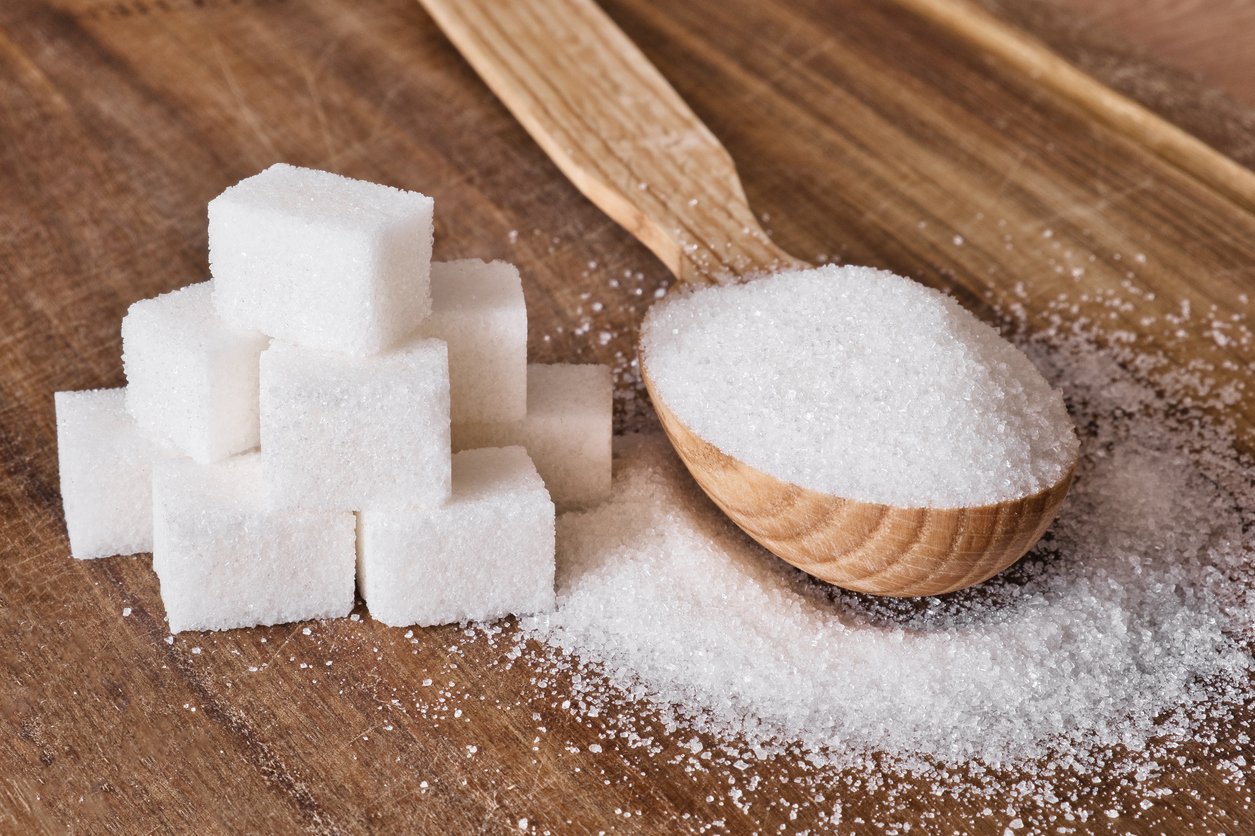
We have to distinguish free sugars (also called “added sugars”) from natural sugars found in fruits and other sweet foods like sweet potatoes and beets. Natural sugars are bound with fiber and water and tend to be good for us — in fact, they’re one of your body’s preferred energy sources.
On the other hand, free sugars have had their fiber and water stripped away. In nature, you rarely find free sugars outside of honeybee hives (and those bees will make sure you think twice before taking their honey).
How much free sugar are we eating? In the US, among people who are the highest consumers of ultra-processed foods, almost 20% of total calories come from free sugars.
One of the many reasons to limit free sugars is that they can harm your gut microbiome. Specifically, they can negatively impact the synthesis of important products of gut bacteria called short-chain fatty acids (SCFAs). This, in turn, can compromise the integrity of your intestinal barrier, leading to chronic inflammation that often fuels metabolic conditions.
Because sugars can be so bad for you, many people prefer products sweetened with artificial sugar substitutes. Unfortunately, researchers are discovering that these chemicals may actually have a very problematic effect on your gut microbiome. A 2022 study found that just 10 weeks of sucralose (aka Splenda) consumption led to a significant increase in concentrations of harmful bacteria and a decrease in beneficial ones.
What’s more, as counterintuitive as it may seem, studies tell us that people who drink diet sodas are more likely to gain weight. In one study, participants who started out at a normal weight and drank 21 diet sodas per week were twice as likely to be overweight or obese eight years later as their non-diet-soda-drinking peers. While the exact reason for this is unclear, it seems plausible that there could be a microbiome connection.
Unhealthy Fats
The types and concentrations of microbes in your gut, and therefore the function of your intestinal barrier, are heavily influenced by the amount and composition of fat in your diet. In particular, there’s an association between long-chain saturated fatty acids (found in vegetable oils along with dairy and other animal products), dysbiosis, and impaired intestinal barrier function. This can lead to metabolic endotoxemia, a condition in which certain toxins leak into your bloodstream from your gut, leading to an inflammatory response in the immune system.
And there’s a well-documented association between inflammation and depression.
Artificial Additives and Preservatives

Artificial additives and preservatives also can cause damage to the gut microbiome.
A 2019 study found that two additives — sodium sulfite and polysorbate 80 — strongly inhibited the growth of a beneficial gut bacterium called Faecalibacterium prausnitzii.
Carrageenan, often added to ultra-processed foods as an emulsifier or thickening agent, can also disrupt the intestinal barrier, leading to inflammation.
Evidence Linking Ultra-Processed Foods and Depression
We’ve already identified several key mechanisms by which ultra-processed foods can trigger effects in the body that are associated with depression. If this were a detective novel, the crusty private eye would tell the client, “This is all circumstantial. A jury would laugh it out of court.”
Over the past few years, however, research has turned up convincing evidence for a strong link between ultra-processed foods and depression.
A 2022 meta-analysis of 17 published observational studies of almost 400,000 people found that people who ate more ultra-processed foods were more likely to experience symptoms of depression. And the results appeared to be cumulative; eating a lot of these foods over time increased the risk of developing depression later on.
Three papers published in 2023 replicated these findings. One looked at 14 years of data from over 30,000 adult women participating in the Nurses Health Study II. The researchers found that participants who consumed the most ultra-processed food had a 50% higher risk of serious depression than those who consumed the least. Artificial sweeteners and artificially sweetened beverages were highlighted as having the greatest contribution to depression.
A study using data from the Korea National Health and Nutrition Examination Survey also found that eating a lot of ultra-processed food was linked to a higher incidence of depression, especially in women. Data from almost 10,000 women showed that those who ate the most ultra-processed foods were 50% more likely to have depression.
Another study recruited 152 adults to see how their diets, mental health, and brain structures were connected. The researchers found that when people ate a lot of ultra-processed foods, parts of their brains shrunk — specifically, the posterior cingulate cortex and the left amygdala, regions dedicated to maintaining a sense of self and enabling emotional regulation. Not surprisingly, the people who ate the most processed food also suffered from an increased risk of depression.
Foods and Nutrients That Help Fight Depression
Now that we have a good sense of what foods and ingredients are linked to depression, let’s look at nutrients that can reduce dysbiosis, inflammation, and other biochemical processes associated with depression. You might think of these substances as natural antidepressants.
Fiber
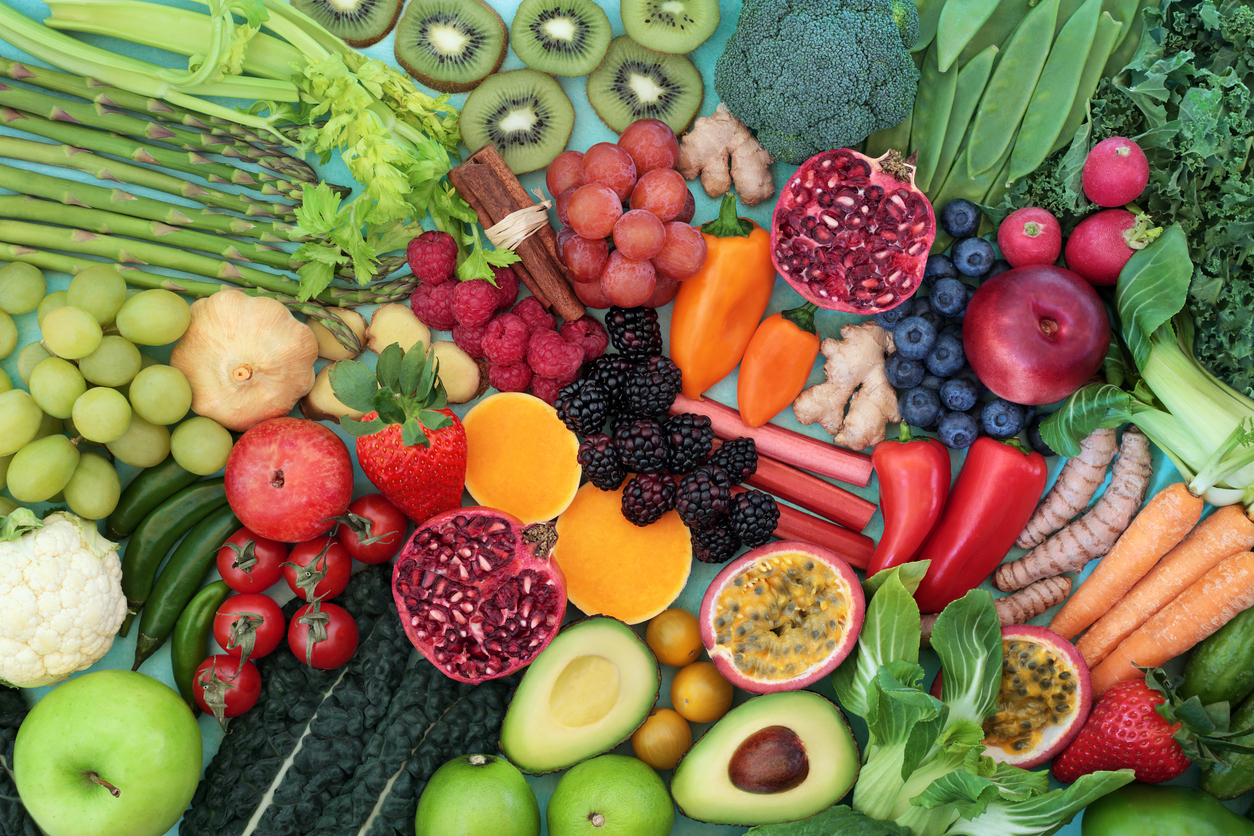
When it comes to your mood, fiber is fabulous. Low fiber intake is a risk factor for depression, and getting enough fiber is crucial for maintaining a healthy gut and central nervous system.
A 2021 study found that women who consumed the most fiber were 37% less likely to have depression than those who consumed the least. And a 2021 meta-analysis of four studies totaling almost 100,000 participants found that for both men and women, the odds of depression dropped by 26% in those who were consuming the most fiber.
Find out more about fiber and why it’s good for you.
Antioxidants
Another potential dietary approach to depression (both for treatment and prevention) is to make sure you get enough antioxidants in your diet. One class of antioxidants, polyphenols, is being studied for its potential to manage or prevent depression by reducing oxidative stress and inflammation while modulating the gut microbiota.
A 2021 meta-analysis of seven studies found that the higher people’s dietary total antioxidant capacity (dTAC) scores, the lower their chances of experiencing depression. Based on prior research, the paper’s authors identified specific antioxidants that are known to be related to mental health, including polyphenols, beta-carotene, and vitamins A and C.
Here are some of our articles that go into more depth about the wonderful world of antioxidants:
- Antioxidants in general
- Vitamin A (and its precursor, beta-carotene)
- Vitamin C
- Polyphenols
Healthy Fats
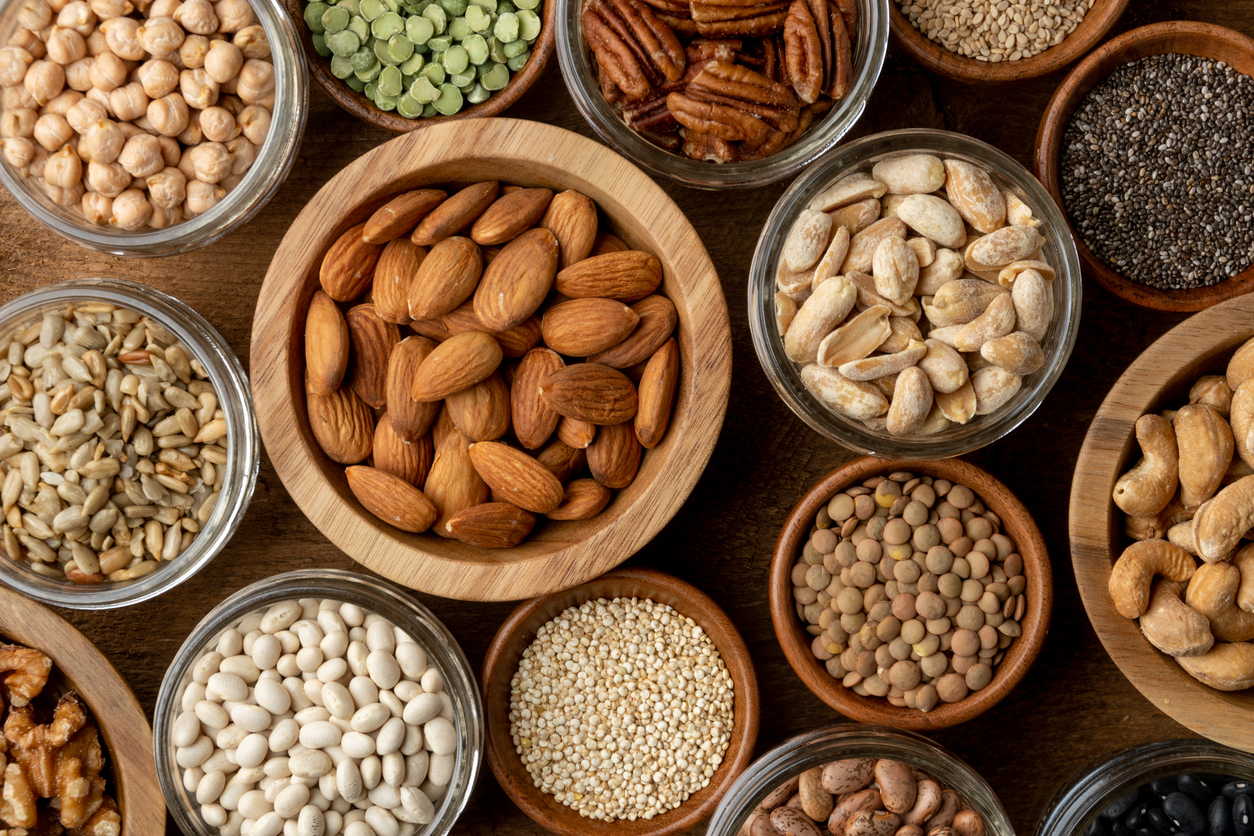
Good fats are crucial for the health of the central nervous system since its tissues are made up of high concentrations of lipids. Omega-3 fatty acids, in particular, are critical to mental health.
A 2019 meta-analysis of 26 studies totaling over 2,100 participants who already had depression found that supplementing with a particular form, EPA, reduced depressive symptoms.
Here’s a deep dive into omega-3s, including why they’re so healthy and the best ways to get them into your diet.
B Vitamins
Vitamins A and C aren’t the only vitamins good for mental health; the B vitamins also play a crucial role.
A 2021 study of over 7,000 Iranian adults found that getting enough biotin (B7) and folic acid (B9) reduced the odds of depression.
Find out more about B vitamins in our article: What B Vitamins Do You Need — And What Are The Best Vegan Sources of B Vitamins?
Vitamin D

Continuing down the alphabet, vitamin D is also an important contributor to mental health.
A 2021 meta-analysis found six controlled clinical trials looking at whether supplementing with vitamin D lessened depression. Three of the studies found that supplementation was effective, while three did not. The authors note that the studies showing no positive effect were short-term and had small sample sizes, which may explain the difference.
Sunshine might also be beneficial against depression. Your body makes its own vitamin D when you’re in the sun.
Read more on vitamin D in our article, Vitamin D Guidelines: What Is It, How Much Do You Need, & How to Get Enough.
Selenium
Some minerals have also been associated with reduced rates of depression.
A 2021 study of Brazilian farmers found that those who consumed the most selenium had half the odds of developing depression compared to those who consumed the least.
And a 2024 review article reported that one way to prevent postnatal depression was to get enough selenium during pregnancy and right after birth.
For our take on selenium, including the best food sources and how much you need, check out our Selenium article.
Zinc
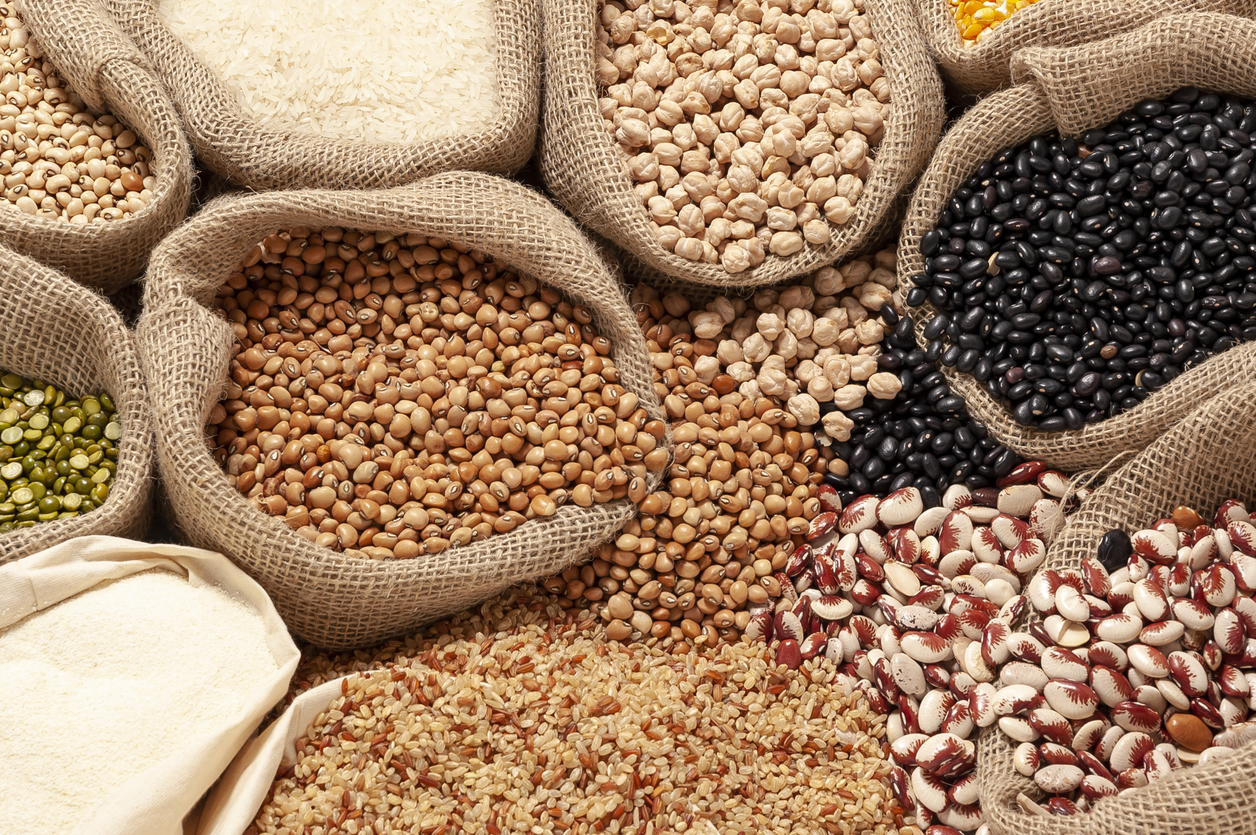
Zinc is another dietary mineral associated with better mental health.
A 2022 meta-analysis found that zinc supplements reduced depressive symptoms in randomized clinical trials. It also analyzed cohort studies and reported that people with the highest zinc intake had a 28% lower chance of getting depressed over time.
Want to know more about zinc? Here’s our article on why zinc is good for you and how much is too much.
Magnesium
Magnesium also contributes to mental health.
A 2020 meta-analysis found that in cohort studies, people with lower serum magnesium levels were more likely to experience depression. Also, for people with existing depression, supplementing with magnesium tended to help, either as a standalone treatment or in conjunction with pharmaceutical antidepressants.
Curious to learn more about magnesium? Here’s our magnesium article that looks at its health benefits, risks, and the best foods that contain it.
Best Foods for Depression
Here’s a handy infographic with specific examples of mental health-boosting foods:

References:
-
[1]
-
[2]
-
[3]
-
[4]
-
[5]
-
[6]
-
[7]
-
[8]
-
[9]
-
[10]
Making Healthier Food Choices
If you want to eat to improve your mood, what are some practical strategies for making healthier food choices to support your mental health?
Aim to base your diet around whole plant foods that aren’t packaged and therefore don’t have nutrition facts labels.
When choosing packaged foods, make sure you read the list of ingredients. Look for items with whole foods listed first, and avoid items with long lists of unpronounceable additives, food dyes, and added sugars.
A good rule of thumb comes from writer and food activist Michael Pollan: “If it came from a plant, eat it; if it was made in a plant, don’t.”
If you experience depression, then you’ll likely be familiar with “bad days,” when even little things feel like a huge struggle. One way to keep making healthy choices when you’re depressed is to meal prep, cook large batches of soups, stews, or casseroles in advance, and portion them into individual servings. You can freeze these pre-portioned meals and pull them out whenever the mood strikes.
These meals function as a kind of “depression insurance,” making it easy to have nutritious options on hand, so you’ll be less tempted to reach for processed foods that could make your depression worse.
And having a stash of healthy snacks at the ready can also guard against reaching for (or getting in a car and driving to get) ultra-processed options.
Whole Food Recipes to Boost Your Mood
When you’re looking to cut back on ultra-processed foods, starting with whole, colorful, plant-based ingredients is a great place to begin. To keep things easy (and tasty), we’ve put together three delicious recipes that are simple to make and feature ingredients you can easily keep on hand. These dishes aren’t just flavorful — they have nutrients that can lift your mental health. With these meals ready to go, you’ll be less tempted to reach for processed options and more likely to enjoy nourishing comfort foods.
1. Three-Grain Peaches and Cream Breakfast Bowl
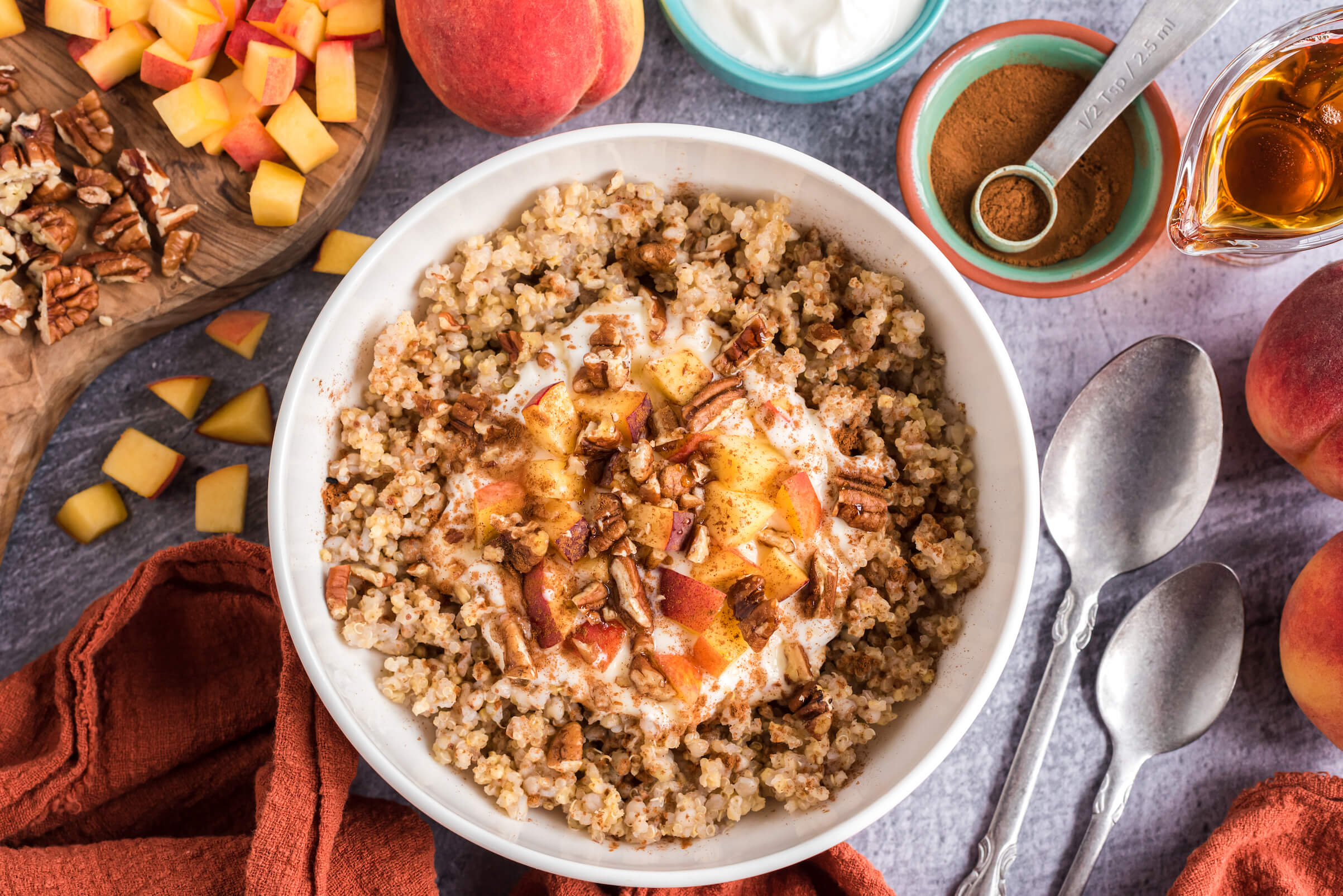
Start your day off right with the Three-Grain Peaches and Cream Breakfast Bowl! This plant-powered delight combines quinoa, millet, and buckwheat — three super grains loaded with nutrients that support mental health and a good mood. With their rich magnesium, B vitamins, protein, and fiber content, these grains will keep you calm, focused, and ready to tackle the day. Topped with creamy, unsweetened plant-based yogurt, juicy peaches, and crunchy pecans, every bite is a burst of flavor and texture. A dash of cinnamon and a drizzle of maple syrup or date paste add just the right amount of natural sweetness without refined sugar or ultra-processed ingredients.
2. The Shine Brightly Salad
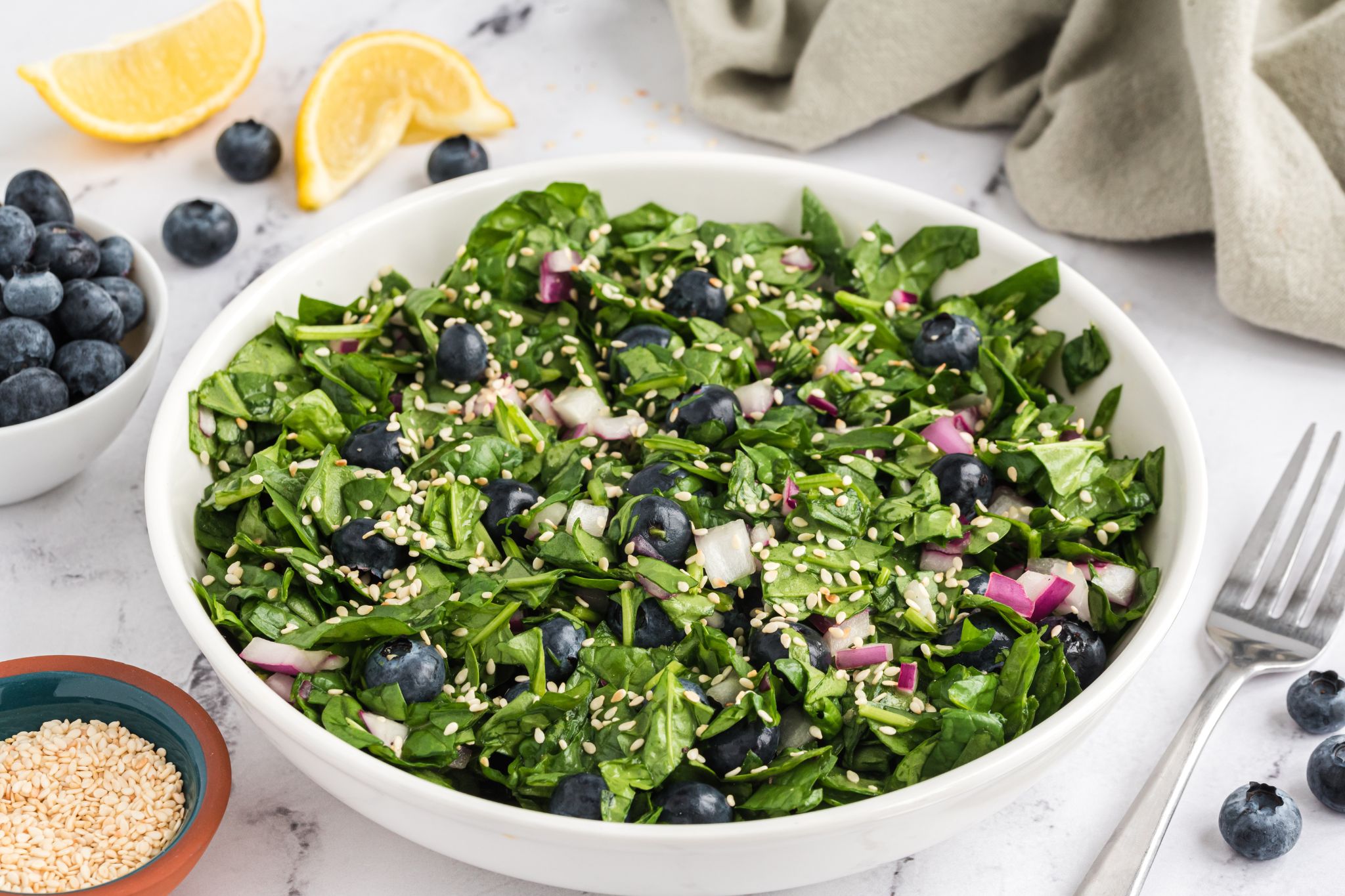
We absolutely love how the Shine Brightly Salad puts a smile on everyone’s faces — especially with those sweet and juicy blueberries (they’re brain-loving superfoods, after all)! These berries contain quercetin, a powerful antioxidant that fights oxidative stress and inflammation, giving your mood a natural lift. This vibrant salad, with fresh leafy greens and crunchy sunflower seeds, is more than just tasty — it’s a mood-enhancing, feel-good dish that will have you glowing from the inside out!
3. Everyday Lentil Lunch
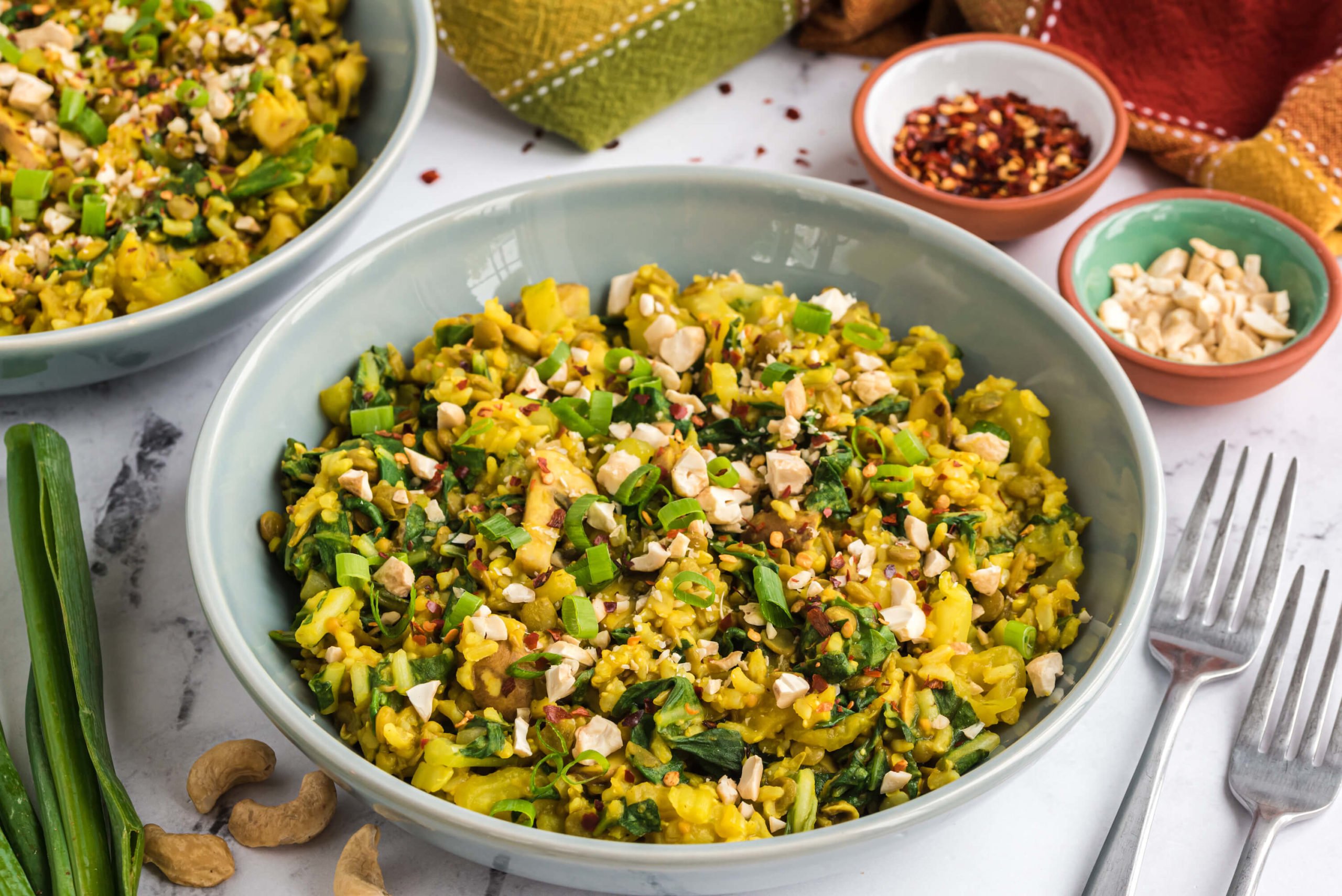
The Everyday Lentil Lunch is one of our all-time favorite go-to recipes, and we are excited to share it with you here! Lentils are a nutritional powerhouse packed with fiber, protein, and antioxidants, providing anti-inflammatory and neuroprotective benefits. This makes them a great choice for supporting your mental health. This dish is not only delicious and easy to prepare, but it’s also bursting with bright flavors and is incredibly satisfying. We recommend cooking extra lentils and brown rice to keep on hand — this might become your new lunchtime favorite every day of the week!
Ditch Ultra-Processed Foods for Better Moods
The evidence linking ultra-processed foods to depression is compelling, with numerous studies highlighting the adverse effects of these foods on mental health. Conversely, diets rich in whole foods, fiber, antioxidants, omega-3 fatty acids, and essential vitamins and minerals can support gut health and improve mood.
Making informed food choices and prioritizing a diet rich in nutrients can positively influence your gut health and mood.
Tell us in the comments:
- Have you experienced clinical depression or subclinical symptoms? If so, did you try any dietary approaches?
- What are your favorite foods that are also good for mental health?
Featured Image: iStock.com/beats3

